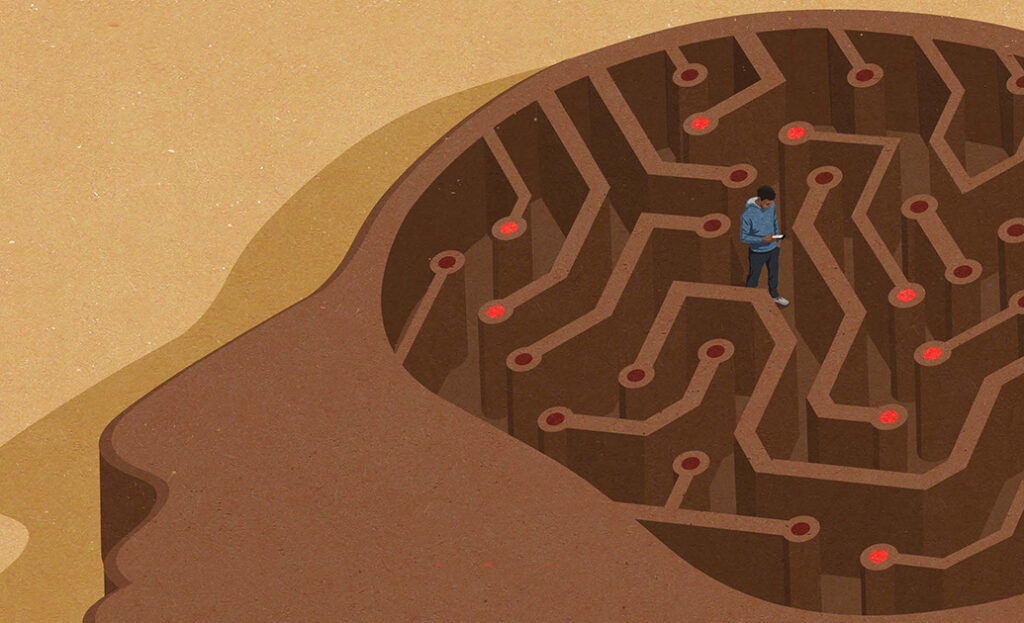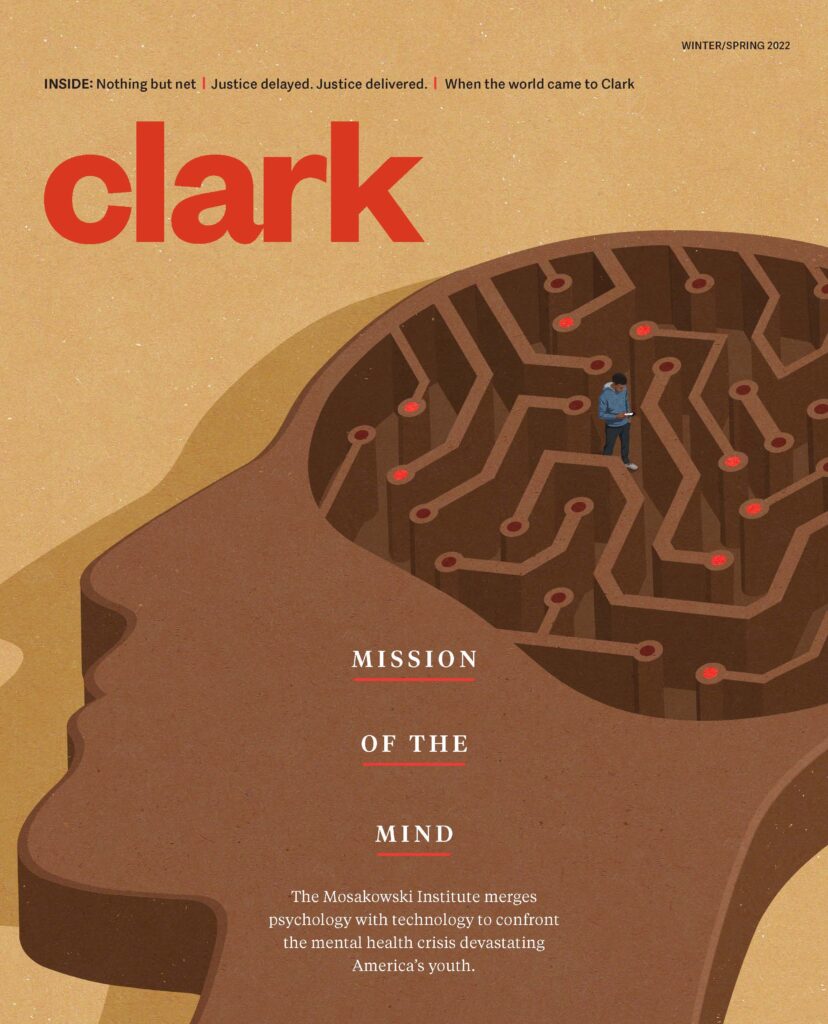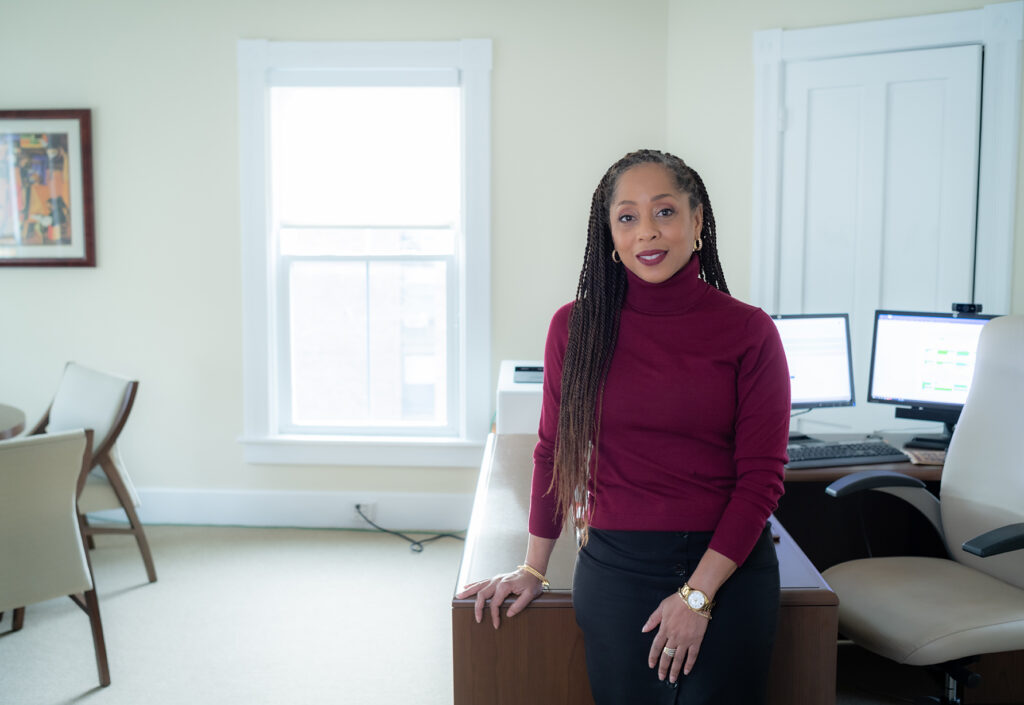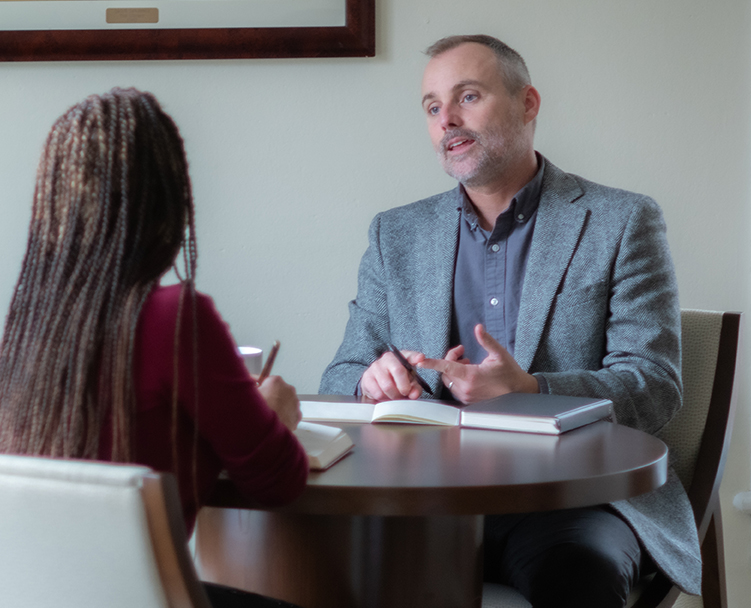Clark Magazine
Mission of the Mind

Olivia has had a rough day.
She couldn’t focus at school, her thoughts bouncing from one topic to another. She lashed out at a friend while working on a class project (she’s not sure why) and is worried about the punishment her teacher will impose. She feels like she can’t catch her breath; maybe she’ll pretend to be sick tomorrow.
At home, Olivia knows she has chores to do — then homework — but instead sits on her bed, mindlessly scrolling on her phone when she notices the MI PEACE icon and opens the app.
“Welcome, Olivia,” the screen reads, quickly changing to a prompt, “How are you feeling?” She thinks for a moment and chooses “not so good.” Olivia clicks on a meditation exercise so she can take time to examine her thoughts and feelings in that moment. She may need to reach out to her counselor through the app, but she knows from experience that taking action is the only way she’ll eventually feel better.

MI PEACE, developed by the Mosakowski Institute for Public Enterprise at Clark University, allows adolescents and young adults — as well as their parents, counselors, and educators — to learn about common behavioral health concerns, assess their own symptoms, and determine a course of action that helps lead them toward a positive outcome.
The app, expected to be released to the public this spring, is just one example of the Mosakowski Institute innovating and delivering interventions and services that help adolescents and young adults develop the social and emotional skills they need to successfully navigate persistent challenges to their behavioral health.
That’s a good thing. Because in the United States today, there are many Olivias.
•••
The reports couldn’t be any clearer: America’s kids are in crisis.
On Dec. 8, 2021, the U.S. Surgeon General issued a rare advisory, warning that young people are facing “devastating” mental health effects from the challenges experienced by their generation.
The advisory echoed the stark declaration made on Oct. 19 by the American Academy of Pediatrics, American Academy of Child and Adolescent Psychiatry, and Children’s Hospital Association:
“We have witnessed soaring rates of mental health challenges among children, adolescents, and their families over the course of the COVID-19 pandemic, exacerbating the situation that existed prior to the pandemic. … The inequities that result from structural racism have contributed to disproportionate impacts on children from communities of color.”
To help combat the crisis, the Mosakowski Institute is directing its intellectual resources toward creating immersive, technology-assisted approaches that effectively treat behavioral health issues among young people. The work has required a significant shift in focus. Established in 2007 with a gift from William ’76, L.H.D.’12, and Jane ’75 Mosakowski, the Institute was launched to provide use-driven research on major issues of social concern, including education, health and well-being, energy and the environment, and economic development. In 2019, Clark’s leadership reimagined the Institute’s mission “to address a social issue of national significance: adolescent mental health,” says Nadia Ward, who was recruited from Yale University to become the Institute’s director that year.

“What I appreciated when I came to Clark two years ago was the bold vision that then-President David Angel and Bill Mosakowski had,” Ward says. “They wanted the work to be about how we address the behavioral health concerns that young people across the country were experiencing — and how we leverage technology in the most innovative ways possible.”
Under Ward’s leadership, the Mosakowski Institute has developed an integrated behavioral model that provides high-quality, evidence-based, and culturally relevant services. She notes that teaching resiliency skills is the most powerful way to address the root causes of behavioral health issues, diminish the stigma associated with those issues, and increase young people’s willingness to disclose their health concerns and seek care. While the work is designed for all adolescents and young adults, there is a special emphasis on boys and young men, particularly those of color (read more in “Working to Shed the Stigma”).
Besides helping youth and families access accurate and comprehensive information, the Institute is collaborating with the School of Professional Studies to develop an online certification program for educators and practitioners. It is also conducting research and partnering with other agencies to maximize the reach and impact of its behavioral health care model.
When mental health practitioners identify a useful intervention — an evidence-based practice to improve a patient’s life — it can take as many as 15 or 20 years of testing and research to get it into the hands of people who want to use it in their work with young people, Ward says. “We actively considered how we could create an evidence base for the resources and tools we are building while simultaneously marketing and scaling them so that practitioners could more quickly use them with youth and their families.”
In short order, the Institute has undertaken four major initiatives: the Sensory Immersion Room at the Solnit Children’s Center in East Windsor, Connecticut; the MI PEACE mobile app; an online social-emotional learning curriculum; and clinical virtual reality therapies.
To advance the Institute’s mission, Ward has sought and established strategic partnerships with the City of Worcester and Worcester Public Schools, as well as organizations like the Greater Worcester Community Foundation, Higher Education Consortium of Central Massachusetts, and UMass Memorial Medical Center, among others. Financial support has come from agencies — including the Ruth H. and Warren A. Ellsworth Foundation, whose trustees include Sumner “Tony” Tilton, LL.D. ’13, life member of Clark’s Board of Trustees — and individuals like Signe Kurian ’91, who embraced the opportunity to raise awareness of and help address the mental health challenges facing America’s younger generations.
In the fall of 2021, the Massachusetts Department of Public Health awarded the Mosakowski Institute, in partnership with the Brookline Community Health Center and DMA Health Strategies, a $35 million grant to conduct a rigorous study of the impact of telebehavioral health services on behavioral health outcomes among young people.
The Institute’s new model of behavioral health care is “an entrepreneurial way of meeting the needs of a social issue that’s of national concern,” Ward says. As a business enterprise that is designed to generate revenue for Clark, the Institute features three divisions: Translational Research, which establishes an evidence base and builds collaborations both within Clark and with outside agencies; Behavioral Health Initiatives, which serves as an incubator for programs and interventions for adolescents and young adults, and oversees the Institute’s overall growth and business strategy; and a soon-to-be-named third entity, separate from the Institute but still a subsidiary of the University, which will be charged with marketing and selling the innovations that the Institute develops.
•••
When the Mosakowski Institute relaunched with its new mission thanks to a substantial gift from Bill and Jane Mosakowski, Ward knew that technology was key. “We had to catch up,” she says. Her experience as a practitioner and as a developer of interventions for schools and communities told her it was time to disrupt the traditional model of behavioral health treatment.
The first initiative to launch was the Clark University Sensory Immersion Room (SIR) at the Solnit Children’s Center, a psychiatric residential treatment facility for boys ages 13–17 whose backgrounds often include trauma, psychosis, depression, or anxiety. The SIR was designed and equipped using extensive scientific and clinical data and expertise that elevates it beyond being a “room with comfortable seating that’s just a place for a student to chill out,” Ward says.
The SIR incorporates Oculus virtual reality headsets, which clinicians can use to create individualized interventions based on a student’s sensory profiles and clinical assessments. Ward hopes some of those clinicians eventually will be from Clark’s doctoral program in psychology, with the sensory room providing myriad opportunities for practical training and experience.

Virtual reality is critical to interventions being created by the Institute. “We’ve developed several different ‘use cases’ with clinical VR,” says Aaron Haddock, director of behavioral health initiatives for the Institute. These use cases — for anxiety, depression, and ADHD — allow patients to develop and refine their coping skills by experiencing different life situations through a VR avatar. “It’s a kind of exposure therapy where you get to experience the success of using your skills to effectively manage your condition.” And if you decide you didn’t make the best choice, you can go back and try again.
The clinical VR development has included a partnership with Booz Allen Hamilton, a leading information technology consulting company whose executive vice president is Gary Labovich ’81, vice-chair of Clark’s Board of Trustees.
The Institute also has developed an online curriculum focused on social-emotional learning (SEL), Digital MAAX2 (Maximizing Adolescent Academic Excellence), based on Ward’s previous work in this field. The program helps students develop the SEL skills that are critical to success in school, work, and life, including self-awareness, self-control, and social/interpersonal skills. The program was set to be piloted in fall 2020, but the pandemic intervened and pushed that launch to this spring.
The fourth intervention, the MI PEACE app, was created when the pandemic forced Ward to “think out of the box about how to connect and engage with young people,” since working with them in schools and community settings was impossible. This work landed the Institute the competitive 2021 Product Innovation Award from Boston-based OutSystems.
“We’ve created a platform that helps schools and youth-serving entities be more efficient and effective in addressing the needs of youths in schools and community settings. Our app helps behavioral health professionals coordinate care for their students using a wraparound service model, and helps adolescents and young people understand and manage their own concerns,” Ward says.
Users of the app can assess how they are feeling in the moment, set goals, and develop strategies to manage and mitigate some of the stressors they’re experiencing. If they choose, they can also employ the app to help them find mental health resources in their community and connect to a professional for assistance.
That human connection is critical, Ward says. “It’s still always about the relationship; the technology doesn’t replace it. The app can serve as a catalyst or facilitator, but at the end of the day, human beings prefer to connect with human beings.”
•••
When COVID-19 spread across the country in early 2020, young people suddenly lost the ability to be with friends and family. Schools shut down and in-person interactions were rare. The only way to socialize was through a computer screen.
For almost two years, students from kindergarten through college saw their normal routines destroyed while pandemic chaos whirled around them. They relied on social media to connect with others, but those platforms also provided constant reminders of the virus’ toll. Many felt trapped by a pervasive sense of fear; others have dealt with the unfathomable loss of a loved one.
Every student’s pandemic experience has been different, Ward says. “You don’t know what their families have been going through — unemployment, food or housing insecurity, grief — and they’re bringing all of that back with them to school. Everybody is worried about the learning loss, but you can’t get to the learning loss without attending to kids where they are right now, emotionally and psychologically. Spend time on the social-emotional work and then create space for them to learn.”
As the world continues to wrestle with its pandemic realities, the Mosakowski Institute is strategizing the next steps it will take to have maximum impact. One emerging ally close to home is the Becker School of Design & Technology’s game-design program at Clark. “They have an initiative dedicated to serious games, and are going to create games that are engaging for youth and drive mental health outcomes,” Haddock says.
“What Aaron and I ultimately want to do is push the field forward and think about how technology can help practitioners work best with their clients,” Ward says. “Clark is the ideal place for it, with our top-rated psychology program steeped in evidence-based practices on how to work with children, youth, and families.”
The stresses on children and young people show no sign of abating. Indeed, they are present, encroaching, and a continual source of disruption for developing minds. And they make the Mosakowski Institute’s efforts to confront them more important than ever.


